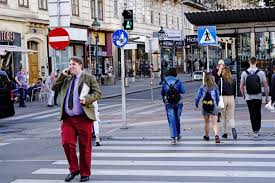Find a Job and Work in Austria, are you seeking employment as a foreigner in Austria? Learn everything you need to know about the Austrian job market, work visa requirements, and how to locate jobs that speak English.
If you’re looking for a good standard of life, above-average pay, and lots of outdoor recreation activities, working in Austria is a great idea. The nation offers several career opportunities for foreigners and embraces new talent.
In addition to providing essential advice to help you find English-speaking job openings in Austria, this post will guide you through the country’s employment market and the requirements for working there.
Is Austria a Good Place to Work?
Of course! Because of its excellent quality of life and vibrant workplace, Australia is a great place to work. One outstanding choice for working overseas is Austria. The country offers excellent work opportunities, particularly for professionals with expertise in technology, life sciences, and tourism.
With a strong social security system and a focus on work-life balance, Austria offers a safe and comfortable environment. Austria guarantees a good level of living by the habit of paying 13th and 14th month salaries and a stable economy. For individuals who are thinking about living and working in Austria, its advantageous location in the centre of Europe adds even more allure.
Can You Work in Austria as a Foreigner?
Indeed, foreigners are permitted to work in Austria. While non-EU/EEA nationals normally require a work visa and residence permission depending on the nature, duration, and qualifications of their jobs, EU/EEA citizens are permitted to work without a separate authorisation.
Requirements for EU and Swiss Citizens
You are free to travel around the EU if you are a citizen of the EU or Switzerland. Although a work permit is not required, you must fulfil following requirements in order to work in Austria:
1. Valid Identification: You must have a valid identity card or passport.
2. Registration: Upon arrival in Austria, you’ll need to register your residence with the local authorities.
3. Social Security: As an employee in Austria, you’re required to contribute to the social security system, which provides access to healthcare, pension benefits, and other social services.
Requirements for Non-EU Citizens
General requirements for working in Austria as a Non-EU citizen include:
1. resident Permit and Work Visa: In order to lawfully work and live in Austria, non-EU/EEA nationals must have a current resident permit and/or work visa. These documents are typically applied for at the Austrian embassy or consulate in your nation of residence.
2. Health Insurance: In Austria, you need health insurance that insures against all possible dangers. You can get public healthcare services once you begin working because your employer is required to register you for social security.
3. Proof of Accommodations: You must show that you have a place to stay in Austria, together with details about how long you plan to stay.
4. Proof of Sufficient Income: You need to show that your income satisfies the amount needed for the permit.
5. Job Market Access: Depending on the kind of residency visa you’re requesting, you may have to provide evidence that the post you’re being offered cannot be filled by an Austrian or EU/EEA citizen. Typically, a labour market test is used for this.
6. Employer Sponsorship: In most cases, your potential employer must assist with the application process by supplying supporting papers and verifying the employment offer.
7. credentials and abilities: Depending on the nature of the work, you may be asked to verify that your credentials and abilities meet the employment criteria.
8. linguistic Needs: There may be linguistic needs to meet, depending on the position and sector.
Can I Get a Job in Austria Without Speaking German?
It can be difficult to work in Austria without knowing German, yet it is feasible in some particular circumstances. English may be used more frequently in some work sectors than others, especially in startups, international corporations, research institutes, the hospitality industry, and several tech-related areas.
Siemens, OMV Group, and Red Bull are a few of the multinational corporations that actively employ foreigners in Austria.
What Jobs Are In-Demand in Austria?
There are many different types of jobs available in Austria, but certain occupations are in high demand right now due to a shortage. You can apply for the Red-White-Red Card for Other Key Workers or the Red-White-Red Card for Skilled Workers in Shortage Occupations if your profession is one of those in demand.
Here’s a list of the shortage occupations in Austria for the year 2024:
- Engineers and Technicians: Power engineers, engineers for agricultural machinery, telecommunications engineers, mechanical engineers, engineers for data processing.
- Healthcare Professionals: Nurses, physicians, medical technology specialists, denture technicians.
- Gastronomy and Hospitality Employees: Restaurant chefs, coffee product makers, butchers, estate managers, store assistants, bakers, waiters/waitresses.
- Business Specialists: Payroll accountants, certified public accountants, business administrators, accountants, billing accountants.
- Physical Employees: Floor and wall tilers, pavers, special floor layers, bricklayers, carpenters.
Even foreigners with little or no proficiency in German have a better chance of finding work in Austria in these in-demand positions, particularly in fields where English is the primary language of operation.
Where to Find Jobs in Austria
Start by looking through a variety of sources, including printed newspapers, social media platforms, and online job boards, to locate employment openings in Austria. Through these channels, employers actively advertise job openings, and the national employment agency provides useful information on Austrian labour regulations, work contracts, and helpful job application advice.
For English-speaking jobs in Austria:
- LinkedIn
- EURES
- Career Jet
- Indeed
- Jobs in Vienna
For German-speaking jobs in Austria:
Attending networking events and job fairs, which offer fantastic chances to meet possible employers, is another successful strategy. In Austria, some noteworthy job fairs are as follows:
- Career Competence
- Trade Fair Dates
Tips for Landing a Job in Austria
In order to increase your chances of landing a job in Austria, you ought to:
1. Do Your Research on the organisation: In your motivation letter and interview, highlight your desire to work for the organisation. If at all possible, explain how your abilities can contribute significantly.
2. Emphasise Useful Skills on Your Resume: Make sure your resume reflects the job description. Keep it brief and put quality first in your applications.
3. Make Sure Your Application Has the Essentials: If you’re having trouble with the format of your motivation letter or CV, check out the Austrian government website for advice on how to apply for a job.
4. Improve Your German: In Austria, job searching is made easier with a basic level of German ability.
5. Network: Participate in employment fairs and make in-person connections with other foreigners by travelling to Austria occasionally.
Are you ready to begin looking for the job of your dreams in Austria? Learn how to obtain necessary documentation, such a residence permit and work visa for Austria, if that is the case. I wish you luck in your career search!
Conclusion on Finding a Job and Work in Austria
Finding employment in Austria as a foreigner may be a fulfilling experience, with many professional prospects, competitive pay, and a high level of life. Although there may be difficulties due to language problems and visa requirements, many Austrian industries, especially those in technology, healthcare, and hospitality, are willing to hire people from other countries.
Use a range of tools, such as job fairs, networking events, and internet job boards, to increase your chances of landing a position. Important tasks include researching potential companies in-depth, acquiring basic German, and modifying your application and CV to fit job specifications. Furthermore, whether you are an EU/EEA citizen or not, it is crucial that you comprehend and meet the legal criteria for working in Austria.
You may successfully negotiate the Austrian labour market and start a rewarding career in this dynamic and culturally diverse nation by utilising these tactics and persevering in your job hunt. I wish you luck.




